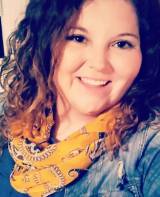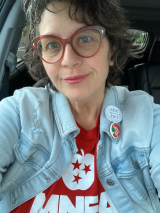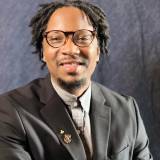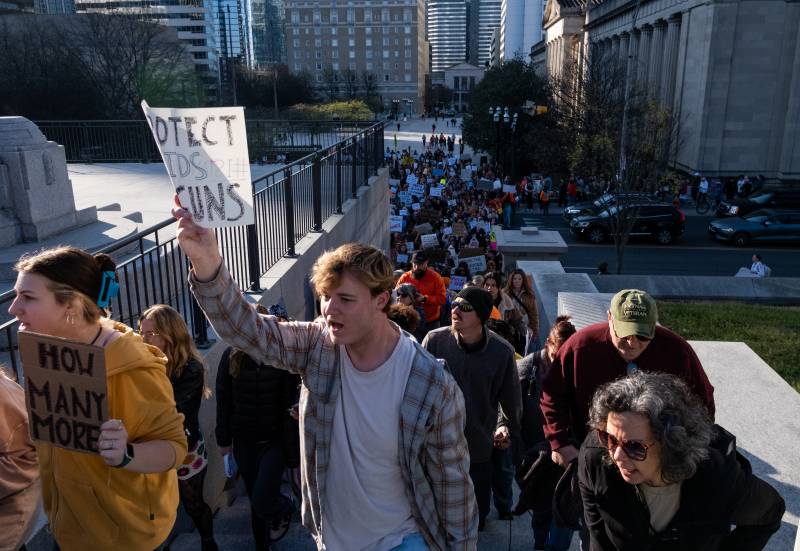Smith said she is “a lover, not a fighter” though. So as Tennessee lawmakers have debated – and largely failed – passing gun control legislation in the wake of The Covenant School shooting, Smith has channeled her anger into advocacy.
She’s among an increasing number of educators joining the thousands who have rallied, marched and protested, calling for change – and begging lawmakers to listen.
Here’s what a few Tennessee educators have to say about school safety – and why speaking out is so important.
Brandy Smith, a pre-K teacher in Nashville, Tenn.
As a teacher, you have to fight
 Since the morning a shooter opened fire at The Covenant School, Smith said she’s more fixated on her school’s escape plans.
Since the morning a shooter opened fire at The Covenant School, Smith said she’s more fixated on her school’s escape plans.
“No matter if we’re in the library or the playground or the classroom, I know the steps,” Smith said. “And every now and then, I’ll just catch myself thinking about it, and then I’ll go over the checklist again in my head.”
She considers herself lucky that preschoolers typically follow directions, but she never imagined she would spend so much time worrying about school safety when she became an educator.
“We would have more time for a lot of other things if we didn’t have to do lockdown drills, and our kids would be safer if we didn’t have people being able to buy guns so quickly,” Smith said while apologizing for crying during her interview.
Smith participated in a local teachers union “sickout” 10 days after the Nashville shooting. The event drew hundreds of Tennessee teachers to the state Capitol as lawmakers considered boosting funding for school resource officers and arming teachers.
That same day, two young Black Democratic legislators were ousted from the Tennessee General Assembly for protesting and calling for gun control on the House floor.
Smith remains cautiously optimistic, though. Since the shooting, protests and rallies have continued at the Capitol and across Nashville.
As a teacher, she considers it her responsibility to advocate for her students and colleagues. But she’s also learned a more sobering duty: “You just have to come to the realization that if I have to — I will, like, fight somebody with a gun to keep them out of my classroom.”
Paige La Grone Babcock, sixth grade teacher at Apollo Middle School in Nashville, Tenn.
Amplifying student voices
 Paige La Grone Babcock isn’t new to advocacy. A member of the local teacher’s union, she often organizes “Red4Ed” action in support of public school teachers.
Paige La Grone Babcock isn’t new to advocacy. A member of the local teacher’s union, she often organizes “Red4Ed” action in support of public school teachers.
Not only is Babcock’s husband also a Nashville schools teacher, but her child attends high school just down the road from The Covenant School.
Babcock thinks most law and policy makers don’t understand the day-to-day of teaching, especially how the fear of mass violence impacts students and staff.
The day after the shooting, Babcock gave her middle school students, many of whom have disabilities or special needs, space to share their feelings.
One 11-year-old student asked, “Why are lawmakers not doing more?”
“Because I don’t feel safe anywhere,” he said. “I don’t feel safe at school.”
She said she almost cried but instead told herself “there’s too much work to do.”
Two days later, she also joined a sickout at the Capitol. With his parents’ permission, she brought the student along.
“When you feel helpless, the antidote to helplessness is to do something,” Babock said. “I felt like it was important for him – who very clearly articulated ‘I do not feel safe anywhere. I do not feel safe at school. This was preventable’ – I felt like he needed an outlet.”
The two met with state and local lawmakers. Her student spoke to a crowd of protestors, rallying around voices like his.
It’s important for students to have their voices heard and realize their influence, she said. “It allowed him to see he was not alone in his big feelings, but it’s not just about making yourself feel better. It’s about advocating for the world in which we want to live in.”
Daven Oglesby, exceptional education teacher at Lakeview Elementary Design Center in Nashville, Tenn.
Advice for lawmakers: Visit schools
 Daven Oglesby’s advocacy is not just for his students. His 6-year-old son also attends the school where he teaches.
Daven Oglesby’s advocacy is not just for his students. His 6-year-old son also attends the school where he teaches.
He said he’s been most troubled by those pushing legislation to allow teachers to carry firearms on Tennessee campuses.
“What type of alternatives were considered prior to the decision being made for teachers carrying firearms,” Oglesby said he wants to ask lawmakers. “We’re not charged with serving and protecting students. We’re charged with educating.”
Oglesby already worries about the stress lockdown or active shooter drills have on students, many of whom are easily disturbed by changes in their routine or environment, like suddenly turning off the lights or being forced to be still and quiet.
He doesn’t think lawmakers realize these aspects when crafting school safety and education policies. “Come visit these schools that you’re making these laws about and ask educators, parents and administrators, ‘What are your thoughts?’” he said.
And if lawmakers won’t do that, Oglesby said it’s his responsibility to speak out and amplify those perspectives along with his students’ voices.
“It’s not enough to just be a teacher. It’s not enough to just sit in the classroom,” he said. “I have to take what I’m learning in the classroom — not just teaching my students, but learning from them as well — and spread that knowledge outside of the classroom.”
Because in the end, Oglesby believes change is possible.
Anna Voorhees, preschool teacher at West End United Methodist Preschool in Nashville, Tenn.
Preschools are often “left out” of conversations
 Anna Voorhees became a daycare worker as a teenager. She currently works with infants as young as eight weeks old at a church-based daycare in Nashville – the same daycare she attended as a child.
Anna Voorhees became a daycare worker as a teenager. She currently works with infants as young as eight weeks old at a church-based daycare in Nashville – the same daycare she attended as a child.
In recent weeks, she and her colleagues frequently think about what they would do “if someone gets into the building.”
“How would I protect my students?” she’ll ask herself, Voorhees said. “Are we going to attempt to hide and try to find something to barricade the door with, or are we going to climb out a window and pass babies through it?”
When asked how many times she has joined the recent throng of protestors, Voorhees pauses. She can’t remember. She comes from a long line of activists. Her father, Jay Voorhees, is a pastor and has spent decades advocating for Nashvillians experiencing homelessness.
She’s marched alongside others, asking lawmakers to enact tighter rules for purchasing firearms or allow officers to take firearms from someone deemed a risk to themselves or others, commonly known as “red flag laws.”
Voorhees said marching and chanting is as much for her as it is for her students.
“I have anxiety, and it’s become worse with everything going on,” she said. “One of the ways that I find myself healing the most is by being here, using my voice. It’s harder for me to find energy to do nothing.”
Like private schools, she believes preschools and daycares are too often excluded from school safety plans.



 Since the morning a shooter opened fire at The Covenant School, Smith said she’s more fixated on her school’s escape plans.
Since the morning a shooter opened fire at The Covenant School, Smith said she’s more fixated on her school’s escape plans. Paige La Grone Babcock isn’t new to advocacy. A member of the local teacher’s union, she often organizes “Red4Ed” action in support of public school teachers.
Paige La Grone Babcock isn’t new to advocacy. A member of the local teacher’s union, she often organizes “Red4Ed” action in support of public school teachers. Daven Oglesby’s advocacy is not just for his students. His 6-year-old son also attends the school where he teaches.
Daven Oglesby’s advocacy is not just for his students. His 6-year-old son also attends the school where he teaches. Anna Voorhees became a daycare worker as a teenager. She currently works with infants as young as eight weeks old at a church-based daycare in Nashville – the same daycare she attended as a child.
Anna Voorhees became a daycare worker as a teenager. She currently works with infants as young as eight weeks old at a church-based daycare in Nashville – the same daycare she attended as a child.